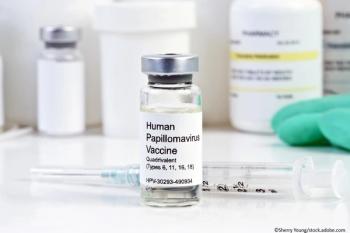
Pap Tests Advised for Sexually Active Older Unmarried Women
SACRAMENTO, Calif. -- Sexually active postmenopausal women who are not married or living as married may benefit from continued cervical cancer screening, researchers here reported.
SACRAMENTO, Calif., Aug. 3 -- Sexually active postmenopausal women who are not married or living as married may benefit from yearly screening for cervical cancer, researchers here reported.
Unmarried older women or those not living as married who are sexually active have an increased risk of high-grade cervical abnormalities and cervical cancer compared with married women or those not sexually active, according to a report in the August issue of Obstetrics & Gynecology.
In the same study, estrogen-progestin therapy was found to increase the risk of having an abnormal Pap test, but it was not specifically linked to high-grade epithelial lesions or actual cervical cancer, according to Shagufta Yasmeen, M.D, of the University of California at Davis, and colleagues.
These results came from a six-year analysis of a prospective cohort of 15,733 postmenopausal women (ages 50 to 79; all with a uterus) participating in the randomized controlled Women's Health Initiative clinical trial.
In an analysis of risk factors other than hormone therapy, the researchers singled out sexual activity. Over a six-year follow-up, independent risk factors for high-grade squamous intraepithelial lesions and cervical cancer (after stratifying for baseline cytologic abnormalities) included sexual activity in the past year while not being married or living as married (hazard ratio 3.5, 95% confidence interval 1.5-8.3).
After further adjustment for significant covariates, the statistically significant predictors of any abnormal cytology after a normal baseline smear still included not being married or living as married and being sexually active at baseline or year one (HR 1.4, CI 1.1-1.8), the researchers reported.
The overall annual incidence of high-grade abnormalities or cervical cancer was significantly higher (19.5 per 10,000 person years) among the sexually active neither married nor living as married women compared with women not sexually active or married (11.3 per 10,000 person-years.) The same order of risk was seen among a subset of women with normal cervical cytology at baseline, the researchers reported.
Turning to the study's hormone analysis, the researchers reported that although hormone therapy with conjugated equine estrogen and medroxyprogesterone was associated with an increased incidence of any cytologic abnormality, it had no impact on the incidence of high-grade squamous epithelial lesions or cervical cancer.
Other findings for women on estrogen-progestin therapy:
- The risk of hormone therapy as a significant predictor of any abnormal cytology after a normal baseline smear was significantly higher than that in the placebo group (HR 1.4, CI 1.2-1.6).
- Hormone therapy over a six-year period did not affect the incidence of high-grade abnormalities or cervical cancer, although hormone therapy did increase overall abnormalities among women with normal smears at baseline.
- Post-menopausal women with normal baseline cervical cytology had a relatively low risk of developing new cytological abnormalities, and the cumulative incidence of high-grade cytology in the hormone group over three to six years was less than 0.01%
- Postmenopausal women taking hormone therapy who were normal at baseline had a significantly higher risk of low-grade cytological abnormalities compared with women assigned to placebo.
Postmenopausal women with normal baseline cytology had a relatively low risk of developing new abnormalities, and the cumulative incidence of high-grade lesions over a follow-up period of three to six years was less than 0.01%. The estimate of squamous cell cervical cancer after negative cytology (0.93 cases per 10,000 person-years) was generally consistent with other estimates, the researchers said.
Nevertheless, Dr. Yasmeen added, although there is an age-related decrease in cytological abnormalities, the "incidence drops neither fast enough nor low enough to ignore the risk of high-grade cytologic abnormalities and cervical cancer in all women over the age of 70 years."
The main limitation of the study, Dr Yasmeen noted, is that the women in the trial may have been at low risk for cervical cancer, and the study may have been underpowered to estimate the differences in risk of high-grade lesions and cervical cancer. In general, the vast majority of cervical cancer cases occur among women who have not been previously screened or who have not had three consecutive normal results.
Current recommendations by the American Cancer Society to discontinue screening for women at age 70 do not take into account risk factors such as continuing sexual activity, which may involve new partners and associated exposure to human papillomavirus, the researchers said.
Cox analysis found that among the significant predictors of any abnormal cytology after a normal baseline smear was having a new sexual partner in the past year (HR 1.4, CI, 1.2-1.8).
For low-risk postmenopausal women (married or not sexually active) with normal cytology screening, the investigators agreed that triennial screening would be appropriate because the absolute risk of undiagnosed cervical cancer within three years of a normal smear is very low.
On the other hand, Dr. Yasmeen concluded, the study suggests that sexually active unmarried elderly women may benefit from continued cervical cancer screening, even if they have previously had normal cervical cytology.
The researchers noted that Wyeth-Ayerst Research provided the study medication (active and placebo) for this study.
Newsletter
Enhance your clinical practice with the Patient Care newsletter, offering the latest evidence-based guidelines, diagnostic insights, and treatment strategies for primary care physicians.































































































































